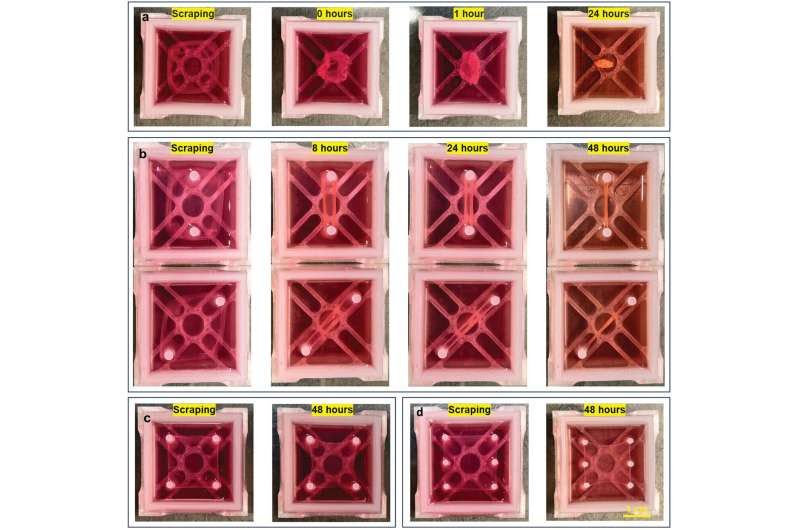by University of Waterloo

Cell sheets are guided to form anchored, scaffold-free constructs for in vitro modeling by providing pillars that act as anchors for otherwise anchorless cell sheets. Credit: Advanced Functional Materials (2023). DOI: 10.1002/adfm.202308552
People who have experienced significant muscle damage have new hope thanks to Evolved.Bio, a startup that has developed innovative technology that can regenerate muscle tissue in a highly effective way.
Other biotech companies use natural or synthetic materials along with cells to create in vitro-grown tissue replacements, building blocks that can be implanted into the human body. But a patient’s body might register these as foreign objects, leading to medical complications or interference with the body’s natural healing process.
Evolved.Bio’s method for making in-vitro tissue circumvents that problem, increasing positive outcomes for patients. The paper, “Anchored Cell Sheet Engineering: A Novel Scaffold-Free Platform for in vitro Modeling,” was published in Advanced Functional Materials.
“We have a completely new technique allowing cells to recreate all of the components and structure of healthy tissue outside of the body, so when it is implanted, the building block has all the characteristics the body expects to see, and it can guide the patient’s cells to restore the tissue,” said Alireza Shahin, Co-founder and CEO of Evolved.Bio, a company based out of Velocity, University of Waterloo’s startup incubator.
While this novel technology can be used with any cell type and tissue, Evolved.Bio is focusing on muscle tissue for volumetric muscle loss—specifically skeletal muscle tissue, which is the largest tissue in human bodies responsible for producing movement.
“We are starting with a product aimed at tackling volumetric muscle loss, a condition that plagues hundreds of thousands of people each year and currently stays largely untreated,” said Shahin. “When patients lose a big part of their muscle, they lose the ability to move around and generate force. There are no good solutions for that, but we hope our new technology can be one of them.”
Evolved.Bio co-founder John Cappuccitti said the company’s technology can also be used in other industries, such as “cultivated meat” where meat protein can be manufactured by culturing animal cells in vitro, but their objective is to use its muscle tissue method for regenerative medicine purposes.
“There are no other good solutions in this space and a lot of known cases of people who have other techniques used on them that never fully regained muscle function,” said Cappuccitti. “We intend to end that suffering permanently.”
Evolved.Bio has been based at Velocity since 2021 and both co-founders said being plugged into the incubator’s network has helped forge indispensable connections as the company developed its emerging technology.
“Being at Velocity has made an enormous difference in developing our tech, not just from a facility standpoint but also from a people standpoint by having staff and other founders around to help,” said Cappuccitti.
More information: Alireza Shahin‐Shamsabadi et al, Anchored Cell Sheet Engineering: A Novel Scaffold‐Free Platform for in vitro Modeling, Advanced Functional Materials (2023). DOI: 10.1002/adfm.202308552
Journal information: Advanced Functional Materials
Provided by University of Waterloo

Leave a Reply